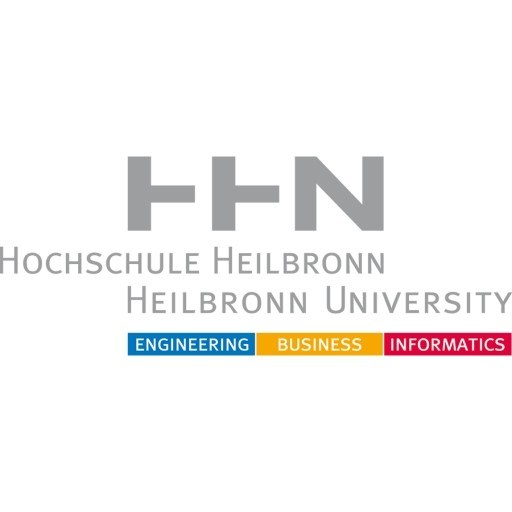Founded in 1961, Heilbronn University of Applied Sciences (Hochschule Heilbronn) has a rich history rooted in meeting the educational and economic needs of the Baden-Württemberg region in Germany. Initially established as a technical school, the university evolved over the decades into a comprehensive university of applied sciences, offering a wide range of bachelor's and master's degree programs across disciplines such as engineering, business, computer science, and health sciences. Throughout its development, Heilbronn University has maintained a strong focus on practical relevance and close collaboration with industry partners, which has contributed significantly to its reputation for fostering applied research and innovation. In 1996, the institution was officially recognized as a university of applied sciences, marking a milestone in its trajectory toward academic excellence and regional development. Over the years, the university expanded its campus facilities, introduced new programs aligned with technological advancements, and increased its international activities to attract students and faculty worldwide. Today, Heilbronn University continues to thrive as a modern institution committed to high-quality education, applied research, and strong regional ties, with a mission to prepare students for successful careers in a dynamic global economy. Its history reflects a consistent dedication to innovation, practical skills, and societal relevance, making it a key player in higher education within Germany.
The admission requirements for Heilbronn University of Applied Sciences are designed to ensure that prospective students have the necessary academic background and language skills to succeed in their chosen programs. Applicants must typically hold a recognized school leaving certificate or an equivalent qualification that grants access to higher education in their home country. For international students, proficiency in German or English is required, depending on the language of instruction of the selected program. For programs taught in German, proof of German language proficiency through tests such as DSH or TestDaF is necessary, while for English-taught programs, standardized English language tests like TOEFL or IELTS are generally accepted. Some programs may require additional entrance examinations or interviews to assess the suitability and motivation of applicants. The application process is usually conducted online through the university’s admissions portal or via the uni-assist service, which evaluates international applications. Applicants must submit various supporting documents, including certified copies of diplomas and transcripts, language proficiency certificates, a motivation letter, CV, and a passport copy. Deadlines for application submissions vary depending on whether the applicant is from within Germany or abroad, with international applicants often advised to apply well in advance to allow sufficient processing time. In certain cases, applicants may need to demonstrate relevant work experience or specific prerequisites related to their chosen field of study. The university also offers preparatory courses or assessments for students whose credentials do not fully meet admission standards. For master's programs, applicants generally need to hold a relevant undergraduate degree or diploma, along with proof of language proficiency and other program-specific requirements. It is recommended that prospective students consult the official university website or contact the admissions office directly for detailed and up-to-date information regarding specific programs and admission procedures.
Heilbronn University is accredited by ACQUIN (Akkreditierungsagentur akkreditiert), which is a recognized accreditation agency for higher education institutions in Germany and internationally. The accreditation process involves a comprehensive evaluation of the university's programs, quality assurance measures, and institutional responsibilities to ensure high standards in teaching, research, and graduate employability. Additionally, Heilbronn University holds accreditation for specific programs, which are periodically reviewed and renewed to maintain their quality standards. The university’s commitment to maintaining accreditation status demonstrates its dedication to providing high-quality education and continuous improvement. Accreditation by reputable agencies like ACQUIN ensures that the degrees offered are recognized nationally and internationally, facilitating graduates’ career opportunities across borders. The accreditation process also involves internal quality assurance systems, systematic reviews, and feedback mechanisms to uphold and enhance the educational quality. Heilbronn University actively participates in national and international accreditation initiatives, collaborating with other institutions to promote excellence in higher education. This rigorous accreditation framework affirms the university’s position as a reputable institution in Germany, committed to academic integrity and excellence. Overall, Heilbronn University’s accreditation status underscores its adherence to strict standards and its ongoing efforts to deliver education that meets the evolving needs of students and the workforce.
Heilbronn University offers a compelling combination of practical orientation, strong industry links, and innovative teaching methods that attract students from around the world. The university is well-known for its focus on applied sciences and provides a wide range of bachelor’s and master’s degree programs in fields such as engineering, business, and computer science. The university’s close collaborations with regional and national companies enable students to gain real-world experience through internships, cooperative education, and research projects, enhancing their employability after graduation. Heilbronn University emphasizes a hands-on approach to learning, integrating practical exercises and projects into the curriculum to prepare students for the challenges of the professional world. The university also benefits from a modern campus equipped with state-of-the-art laboratories and facilities, fostering an environment conducive to innovation and creativity. Its international orientation is exemplified by numerous partnerships with universities worldwide, exchange programs, and support services for international students, making Heilbronn a diverse and inclusive academic community. Additionally, the university places a strong emphasis on research and development, particularly in areas relevant to industry needs, which contributes to its reputation as a center for innovation. Students also benefit from personalized support services, modern infrastructure, and a vibrant campus life that promotes personal development alongside academic achievement. The location in Heilbronn, a thriving economic hub in southwestern Germany, provides ample opportunities for networking, career development, and industry engagement. Overall, Heilbronn University stands out for its practical relevance, international focus, and dedication to student success, making it an excellent choice for those seeking a modern, industry-oriented higher education experience.
